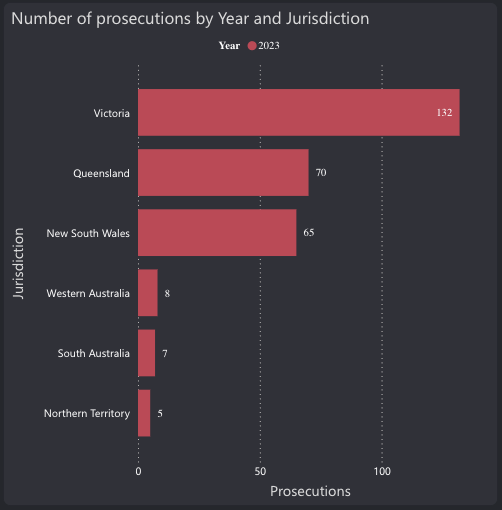When considered as a whole, Workplace Health and Safety (WHS) prosecutions have increased across Australia. The latest data from 2023 highlights the growing enforcement of safety standards and the severe consequences for non-compliance.
Exploring the data
After reviewing the latest update on the Safe Work Australia Dashboard, we can observe that:
- Victoria led with 132 prosecutions of Persons Conducting a Business or Undertaking (PCBUs), accounting for 45% of the national total.
- Queensland followed with 70 cases (24%).
- New South Wales had 65 cases (22%).
Nationally, 293 prosecutions were recorded for breaches of WHS Acts and/or regulations. After reviewing the numbers, we observe:
- Fatal Injuries: 15% (45) of the prosecutions involved fatal injuries, underlining the risks of non-compliance.
- Financial Penalties: Total penalties across all prosecutions reached $40 million, with an average penalty of $138,724 per case.
- Guilty Pleas: 72% of the cases resulted in guilty pleas from the defendant PCBUs, highlighting clear evidence of safety breaches.
The Importance of Compliance with WHS Regulations
Compliance with WHS regulations is more than a legal requirement; it’s essential for business operations. Non-compliance can lead to severe consequences, including financial penalties, reputational damage, and even loss of life. By adhering to WHS standards, businesses protect their employees, clients, and overall reputation.
Why Compliance Matters:
- Legal Protection: Compliance reduces the risk of legal actions and fines.
- Employee Safety: Adhering to WHS standards ensures a safer work environment, decreasing the likelihood of accidents.
- Reputation Management: A strong commitment to safety enhances your reputation, building trust with clients and stakeholders.
Preventing and Minimising Risks and Hazards
Businesses must proactively manage WHS risks to minimise hazards. This involves regular reviews of safety procedures, risk assessments, and ensuring that employees are well-trained in safety protocols.
Key Steps to Minimise Risk:
- Conduct Regular Audits: Regular audits help identify hazards and non-compliance issues, enabling prompt corrective actions.
- Implement Safety Systems: Effective WHS Management Systems ensure consistent application of safety protocols.
- Engage Employees: Employee involvement in safety programs fosters a culture of safety in the workplace.
- Analyse Data and KPIs: Visualise insights and detect future trends that may impact your business safety performance. Platforms like Safety Champion Software can help you to identify and understand trends and patterns in data.
How we can help
Navigating WHS regulations can be complex. Our expertise can help your business meet these obligations and minimise risks.
Our Services Include:
- Expert Advice: Our consultants provide tailored advice to help you comply with the latest WHS regulations.
- Audits and Reviews: We conduct audits to assess your current safety practices and identify areas for improvement.
- Secondments and Outsourcing: We offer secondment services, providing skilled safety professionals to support your business.
Ensuring compliance with WHS regulations is crucial for legal reasons and the well-being of your employees. Proactively managing risks and seeking expert advice can create a safer workplace and avoid severe consequences.
Contact an Expert today to learn how we can assist you with your WHS obligations.



